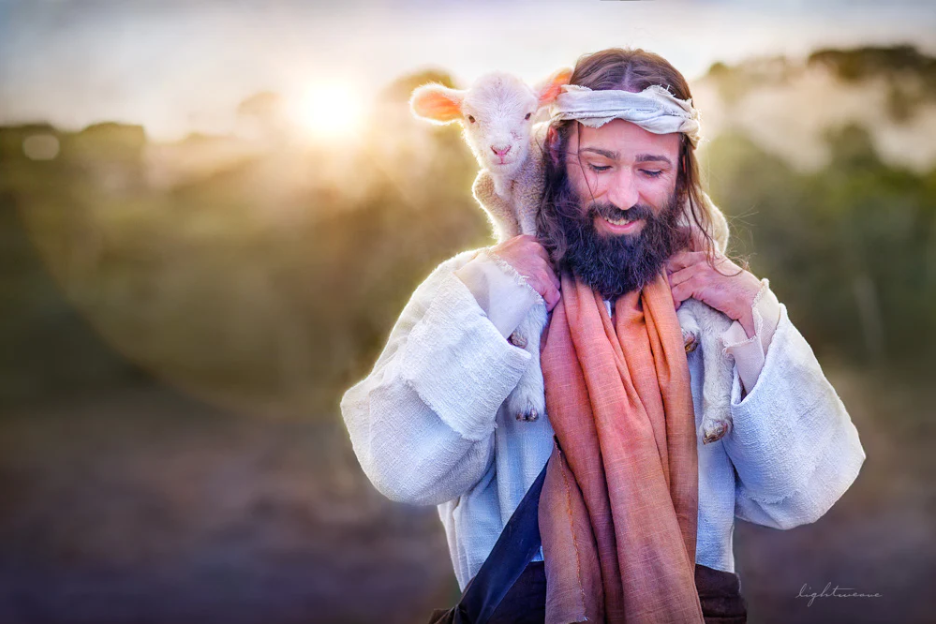My Shepherd
Psalm 23
The Lord is my shepherd; I shall not want. He maketh me to lie down in green pastures: He leadeth me beside the still waters. He restoreth my soul: He leadeth me in the paths of righteousness for His name’s sake. Yea, though I walk through the valley of the shadow of death, I will fear no evil: for Thou art with me; Thy rod and Thy staff they comfort me. Thou preparest a table before me in the presence of mine enemies: Thou anointest my head with oil; my cup runneth over. Surely goodness and mercy shall follow me all the days of my life: and I will dwell in the house of the Lord for ever.
My Shepherd
“The Lord is my shepherd” comes from one of the most beloved of all passages of Scripture, the 23rd Psalm. In this passage and throughout the New Testament we learn that the Lord is our Shepherd in two ways. First, as the Good Shepherd, He laid down His life for His sheep and, second, His sheep know His voice and follow Him (John 10:11, 14).
In Psalm 23, God is using the analogy of sheep and their nature to describe us. Sheep have a natural tendency to wander off and get lost. As believers, we tend to do the same thing. It’s as Isaiah has said: “We all, like sheep, have gone astray, each of us has turned to his own way” (Isaiah 53:6). When sheep go astray, they are in danger of getting lost, being attacked, even killing themselves by drowning or falling off cliffs.
Likewise, within our own nature there is a strong tendency to go astray (Romans 7:5; 8:8), following the lusts of our flesh and eyes and pursuing the pride of life (1 John 2:16). As such, we are like sheep wandering away from the Shepherd through our own futile self-remedies and attempts at self-righteousness. It’s our nature to drift away (Hebrews 2:1), to reject God, and to break His commandments. When we do this, we run the risk of getting lost, even forgetting the way back to God. Furthermore, when we turn away from the Lord, we soon find ourselves confronting one enemy after another who will attack us in numerous ways.
Sheep are basically helpless creatures who cannot survive long without a shepherd, upon whose care they are totally dependent. Likewise, like sheep, we are totally dependent upon the Lord to shepherd, protect, and care for us. Sheep are essentially dumb animals that do not learn well and are extremely difficult to train. They do not have good eyesight, nor do they hear well. They are very slow animals who cannot escape predators; they have no camouflage and no weapons for defense such as claws, sharp hooves, or powerful jaws.
Furthermore, sheep are easily frightened and become easily confused. In fact, they have been known to plunge blindly off a cliff following one after another. Shepherds in Bible times faced incredible dangers in caring for their sheep, putting their own lives at risk by battling wild animals such as wolves and lions who threatened the flock. David was just such a shepherd (1 Samuel 17:34–35). In order to be good shepherds, they had to be willing to lay down their lives for the sheep.
Jesus declared that He is our Shepherd and demonstrated it by giving His life for us. “The Son of Man did not come to be served, but to serve, and to give His life a ransom for many” (Matthew 20:28). Through His willing sacrifice, the Lord made salvation possible for all who come to Him in faith (John 3:16). In proclaiming that He is the good shepherd, Jesus speaks of “laying down” His life for His sheep (John 10:15, 17–18).
Like sheep, we, too, need a shepherd. Men are spiritually blind and lost in their sin. This is why Jesus spoke of the parable of the lost sheep (Luke 15:4–6). He is the Good Shepherd who laid down His life for us. He searches for us when we’re lost, to save us and to show us the way to eternal life (Luke 19:10). We tend to be like sheep, consumed with worry and fear, following after one another. By not following or listening to the Shepherd’s voice (John 10:27), we can be easily led astray by others to our own destruction. Jesus, the Good Shepherd, warns those who do not believe and listen to Him: “I did tell you, but you do not believe . . . you do not believe because you are not my sheep. My sheep listen to my voice; I know them, and they follow me. I give them eternal life, and they shall never perish; no one can snatch them out of my hand” (John 10:25–28).
Psalm 23:1–3 tells us that the shepherd meets the sheep’s every need: food, water, rest, safety, and direction. When we as believers follow our Shepherd, we, too, know that we will have all we need. We will not lack the necessities of life, for He knows exactly what we need (Luke 12:22–30).
Sheep will not lie down when they are hungry, nor will they drink from fast-flowing streams. Sometimes the shepherd will temporarily dam up a stream so the sheep can quench their thirst. Psalm 23:2 speaks of leading the sheep “beside the quiet [stilled] waters.” The shepherd must lead his sheep because they cannot be driven. Instead, the sheep hear the voice of their shepherd and follow him—just as we listen to our Shepherd, Jesus Christ—in His Word and follow Him (John 10:3–5, 16, 27). And if a sheep does wander off, the shepherd will leave the flock in charge of his helpers and search for the lost animal (Matthew 9:36; 18:12–14; Luke 15:3–7).
In Psalm 23:3, the Hebrew word translated “paths” means “well-worn paths or ruts.” In other words, when sheep wander onto a new path, they start to explore it, which invariably leads them into trouble. This passage is closely akin to the warning in Hebrews 13:9: “Do not be carried away by all kinds of strange teachings.” The apostle Paul also alludes to this idea in Ephesians 4:14.
Finally, the shepherd cares for the sheep because he loves them and wants to maintain his own good reputation as a faithful shepherd. As we’ve seen in Psalm 23, the analogy of the Lord as the Good Shepherd was also applied by Jesus in John chapter 10. In declaring that He is the shepherd of the sheep, Jesus is confirming that He is God. The Eternal God is our Shepherd. And we would not want it any other way.
https://www.gotquestions.org/Lord-is-my-Shepherd.html




